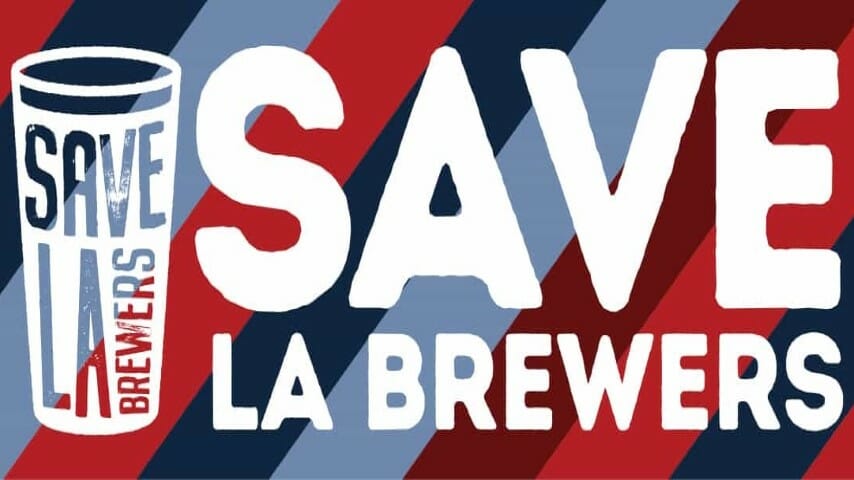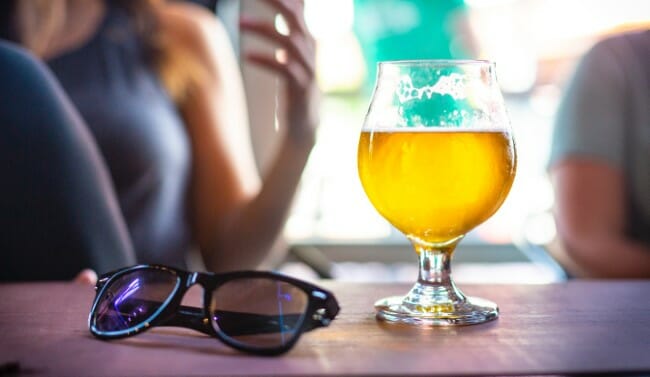L.A. Breweries Are Fighting For Their Lives, Still Prohibited From Serving Beer Even Outdoors
Photos via L.A. Brewers Guild, Unsplash, Drew Beamer Drink Features craft beer
The COVID-19 pandemic has been hell on American craft breweries from coast to coast. In many cases deprived of their most important resource when it comes to selling beer at a life-sustaining profit—which is to say, their taproom spaces—they’ve instead had to cobble together an existence through distribution, to-go sales and outdoor beer gardens/socially distanced patios. There’s already been no shortage of storied brewers calling it quits for good.
Few beer markets, though, have had it rougher than the breweries of Los Angeles. In a city hit hard by the pandemic, dozens of breweries have been functioning for months without even the most basic concessions from their state/city. For more than 60 days, in fact, the breweries of L.A. have been unable to sell beer directly to their customers, even on outdoor patios … unless they happen to have a kitchen, that is. Welcome to the confusing state that is L.A. craft beer.
“Currently, we’re only allowed to-go sales and regular distribution,” said Frances Lopez, executive director of the L.A. County Brewers Guild, which just held an initiative called LABG Action Week to call attention to the struggles of the local industry. “All on-site consumption is not allowed unless you’re a brewpub with a kitchen, in which you’re currently allowed to operate outdoors only. Of the more than 90 breweries in L.A. County, two-thirds do not have kitchen and are at a severe disadvantage right now. L.A. County is the only county left in the entire state where tasting rooms aren’t able to partner with food vendors to meet the ‘meal’ requirement set by State Health in order to reopen.”
Let’s set aside the base ridiculousness of the “meal” requirement in the first place, which automatically favors restaurants and brewpubs over brewery taprooms, somehow attempting to make the argument that drinking a beer on a brewpub patio is safer than doing the same on a brewery patio. If “food” is the only obstacle, it’s something that the brewery taprooms can get around by simply partnering with food trucks, pop-ups and local restaurants, right? Wrong. L.A. County breweries were BRIEFLY afforded this opportunity back in June to open their patios, as long as they were partnered with a food venue to provide meals, but that ability was then stripped away by the end of June with no advanced notice, essentially leaving more than 60 L.A. breweries in the lurch. For two months now, they’ve been unable to use their patios, even if they’re willing to comply with every other state regulation on outdoor dining or beverage service.
 The city’s taproom patios have fallen silent for more than two months now, with no end in sight.
The city’s taproom patios have fallen silent for more than two months now, with no end in sight.
Lopez put together the following timeline, to illustrate how cast aside the city’s breweries have been when it comes to the guidelines on who is allowed to open, and when.
March 14 – All bars, breweries, and wineries were to close for on-site consumption immediately. As federally recognized beverage manufacturers, breweries were allowed to continue to-go and delivery operations ONLY.
June 1 – After nearly 80 days of closed tasting rooms, Los Angeles County finally allowed us to reopen in Phase 2 with specific conditions that we would need to partner with a food vendor to provide meals as a prerequisite for purchasing beer for on-site consumption. *Note – most of California was reopened for phase two in mid-to-late May.
June 19 – After only 18 days of “Phase 2 Service,” L.A. County reopened bars and other businesses. This Phase 3 reopening also made it so that breweries were no longer required to serve meals with beer purchases. Our “Phase 3” lasted 10 days.
June 29 – With zero advanced notice, the county rolled back our operations-once again closing all our tasting rooms. Furthermore, the county also included specific language in the updated health order that explicitly prohibited us from partnering with third-party food vendors to provide meals. It’s been 63 days and counting now and we have no timelines, guidelines, or relief in sight.
You read that right—in the span of merely 28 days, L.A. breweries went from being required to have a food partner in order to open their patios, to not being required to have a food partner to open their patios, to not being able to open their patios at all, unless they happened to possess their own kitchen. All three were true at different points in the month of June, and each time the rules were changed, the local breweries complied with whatever the city required. And they were rewarded for their careful sanitation and socially distanced group seating with an order to close once again, during the time of year when their patios would normally be most full.
“If you look at a restaurant that is operating outdoors and the average craft brewery with outdoor seating and a food vendor, there is NO difference,” said Lopez. “Breweries in our Guild have complied with every single change in the health order for the last 5 months. Many have stretched their resources to the leanest if we can possibly make them, and we’re running out of slack quickly. It’s been disheartening to see that we are the only county not allowing the use of third-party food vendors. This is the only change we need in order for our tasting rooms to be able to operate outdoors just like everyone else in the state. Consumer behaviors aren’t being curbed by not allowing us to operate in the same fashion as restaurants. Instead, folks are merely driving the short distances into neighboring counties. During a time when small businesses are hanging on by a thread, we need our county supervisors to acknowledge that brewery tasting rooms are their own unique classification. Not quite a bar, not entirely just a manufacturer. With sales down (due to bar closures for example), our tasting rooms are our strongest chance for survival. A recent polling of membership showed that roughly 50% of breweries in Los Angeles County do not feel that they will be able to stay afloat through the end of the year should on-site dining continue to be unallowed.”
Decisions on how these breweries are allowed to operate rest with the L.A. Health Department, which is under the jurisdiction of the County Board of Supervisors. Lopez, the L.A. County Brewers Guild, and craft beer fans of the country’s second most populous city are all hoping that public support will eventually force the Board of Supervisors to reconsider the matter, recognizing that brewery taprooms are a subtly different category than your average “bar.” They’ve already ginned up support within the L.A. City Council, which put forward a motion that would request (but not require) the BOS to reconsider the matter, but Lopez fears that for some of the most fragile brewing operations, the writing could already be on the wall.
“We have had one permanent closure during the pandemic so far, but many are heading into grave territory if they do not see relief in the coming weeks,” she said. “We’ve also on-boarded 3 new breweries who have been in the works for years and were forced to open during the pandemic as they needed to begin producing and selling to pay the bills. We are fearful that without relief, these brand-new businesses could be dead on arrival.”